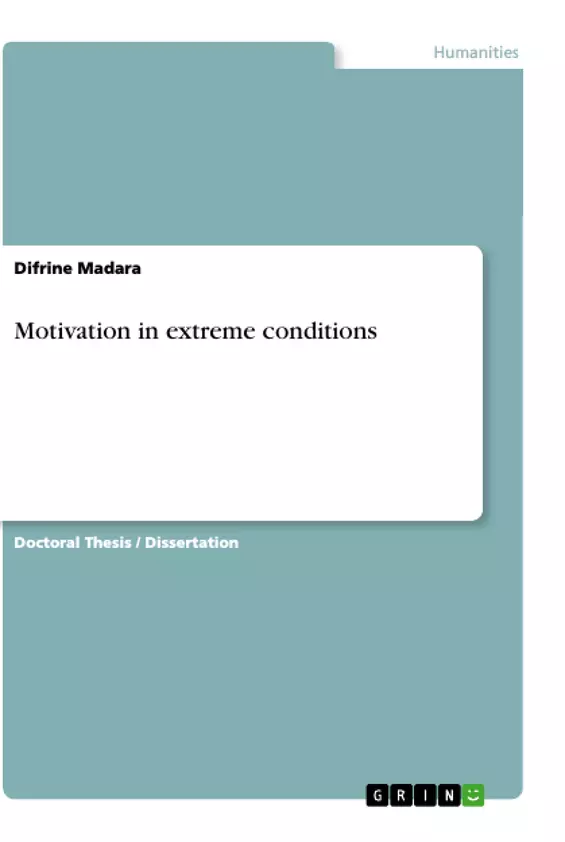Mogadishu, Somalia is one of the most dangerous cities in the world to live in due to the ongoing political instability in Somalia and frequent terror attacks on hotels, diplomatic residences, government offices and even residential areas in the city. In this case, Mogadishu is not just risky to live in but also dangerous to work in. However, there are daring workers who come from all over the world to serve in different capacities and tasks in the city. The researcher, therefore, sought to establish what motivates these people to leave their peaceful countries to work and stay in Mogadishu.
To answer the question, the researcher conducted a qualitative study. The study involved 34 participants who were interviewed on motivation strategies, organisation culture and management of the organisation they work to understand what attracts them to work in Mogadishu. From the interviews, the researcher noted that salaries and bonuses, challenging tasks, need to help the disadvantaged and adventure were the main reasons that made people to leave their peaceful countries and move to Somalia. In a nutshell, the researcher found that motivation to work in violent areas such as Mogadishu depended on a combination of both intrinsic and extrinsic motivation factors as well as environmental factors.
Inhaltsverzeichnis (Table of Contents)
- CHAPTER ONE: INTRODUCTION
- 1.1. Background to the Study
- 1.2. Statement of the Problem
- 1.3. Research Aim and Objectives
- 1.4. Structure of the Dissertation
- CHAPTER TWO: LITERATURE REVIEW
- 2.1. Introduction to the Chapter
- 2.2. Theoretical Framework
- 2.3. The Motivation of International Workers
- 2.4. Employee Empowerment and Career Development in an International Workplace
- 2.5. Challenging Tasks and Risk-Taking in a Foreign Work Environment
- 2.6. Linking Literature Review with Research Objectives and Methodology
- CHAPTER THREE: METHODOLOGY
- 3.1. Introduction
- 3.2. Research Design
- 3.4. Sampling Methods
- 3.5. Instruments Used
- 3.6. Data Collection
- 3.7. Data Analysis
- 3.8. Ethical Considerations
- 3.9. Limitations of the Study
- CHAPTER FOUR: RESULTS OF ANALYSIS
- 4.1. Introduction
- 4.2. Interpretive Paradigm
- 4.3. Themes
- CHAPTER FIVE: DISCUSSIONS AND IMPLICATIONS
- 5.1. Introduction
- 5.2. Summary of the Study
- 5.3. Discussion of Themes
- 5.3.1. Need for Challenging Tasks/Jobs
- 5.3.2. Salaries and Contractual Terms
- 5.3.3. Position to Help Others
- 5.3.4. Adventure
- 5.4. Conclusions
- 5.5. Theoretical Implications, Limitations, And Suggestions for Further Studies
- 5.6. Reflection
Zielsetzung und Themenschwerpunkte (Objectives and Key Themes)
This research aims to explore and understand the motivations of individuals who choose to work in Mogadishu, Somalia, a city characterized by significant political instability, violence, and terrorism threats. The research delves into the factors that drive individuals to leave their peaceful countries and work in such a challenging environment.
- The interplay of intrinsic and extrinsic motivation factors in influencing work decisions in volatile environments.
- The impact of environmental factors, including political violence, terrorism, and governance instability, on worker motivation.
- The importance of salary and contractual terms, challenging tasks, and the opportunity to contribute to helping others in motivating individuals to work in Mogadishu.
- The role of adventure and a desire for unique experiences in driving individuals to seek employment in such a context.
Zusammenfassung der Kapitel (Chapter Summaries)
Chapter One provides the background and context for the study, exploring the challenges and risks associated with living and working in Mogadishu. It outlines the problem of understanding why individuals choose to work in such a volatile environment and introduces the research objectives. Chapter Two delves into the existing literature on employee motivation, examining different theories and perspectives, with a particular focus on how motivation manifests in international workplaces. Chapter Three details the research methodology employed, outlining the design, sampling methods, data collection techniques, and data analysis approaches used to investigate the study's objectives. Finally, Chapter Four presents the findings of the research, highlighting the key themes that emerged from the data analysis. Chapter Five discusses the implications of these findings, offering conclusions, theoretical insights, and suggestions for further research.
Schlüsselwörter (Keywords)
The key terms and concepts explored in this research include worker motivation, extreme environments, conflict zones, Somalia, Mogadishu, political instability, terrorism, intrinsic and extrinsic motivation, job satisfaction, risk taking, humanitarian aid, adventure, and qualitative research.
Frequently Asked Questions
What motivates individuals to work in high-risk cities like Mogadishu?
Research indicates that a combination of intrinsic and extrinsic factors motivates workers, including high salaries and bonuses, the desire for challenging tasks, the need to help disadvantaged populations, and a sense of adventure.
What was the methodology used in this study on motivation in extreme conditions?
The researcher conducted a qualitative study involving 34 participants who were interviewed about motivation strategies, organizational culture, and management to understand what attracted them to work in Somalia.
How do environmental factors influence work decisions in volatile areas?
Environmental factors such as political instability, frequent terror attacks, and governance issues significantly impact motivation, often requiring a unique balance of risk-taking and professional rewards.
What are the key themes explored in the dissertation?
Key themes include the interplay of intrinsic and extrinsic motivation, the impact of political violence on workers, the role of career development in international workplaces, and the drive for unique life experiences through adventure.
Does the study address the role of humanitarian aid?
Yes, one of the primary motivations identified was the "position to help others," which aligns with the goals of humanitarian aid and serving disadvantaged communities in conflict zones.
What is the structure of the research paper?
The paper is structured into five chapters: Introduction, Literature Review, Methodology, Results of Analysis, and Discussions and Implications.
- Quote paper
- Difrine Madara (Author), 2019, Motivation in extreme conditions, Munich, GRIN Verlag, https://www.grin.com/document/504123



